An Analysis of the Service Encounter at KFC: A Comprehensive Report
VerifiedAdded on 2023/06/04
|10
|2909
|236
Report
AI Summary
This report provides a detailed analysis of the service encounter at KFC, a globally recognized fast-food chain. It examines both the front stage operations, including customer interaction, responsiveness, and transparency in order processes, and the back stage operations, such as efficiency, robustness, and scalability within the kitchen and supply chain. The report highlights the importance of managerial roles in forecasting customer numbers, ensuring smooth operations, and maintaining cleanliness and hygiene. Furthermore, it discusses the managerial implications of service encounters, including strategies for attracting customers, menu variations, and budget management. The analysis emphasizes the significance of customer feedback and the impact of managerial decisions on the overall guest experience, from initial impressions to addressing complaints and maintaining operational standards. The report concludes by underscoring the importance of adapting to market demands and maintaining service quality to sustain a competitive edge in the fast-food industry.
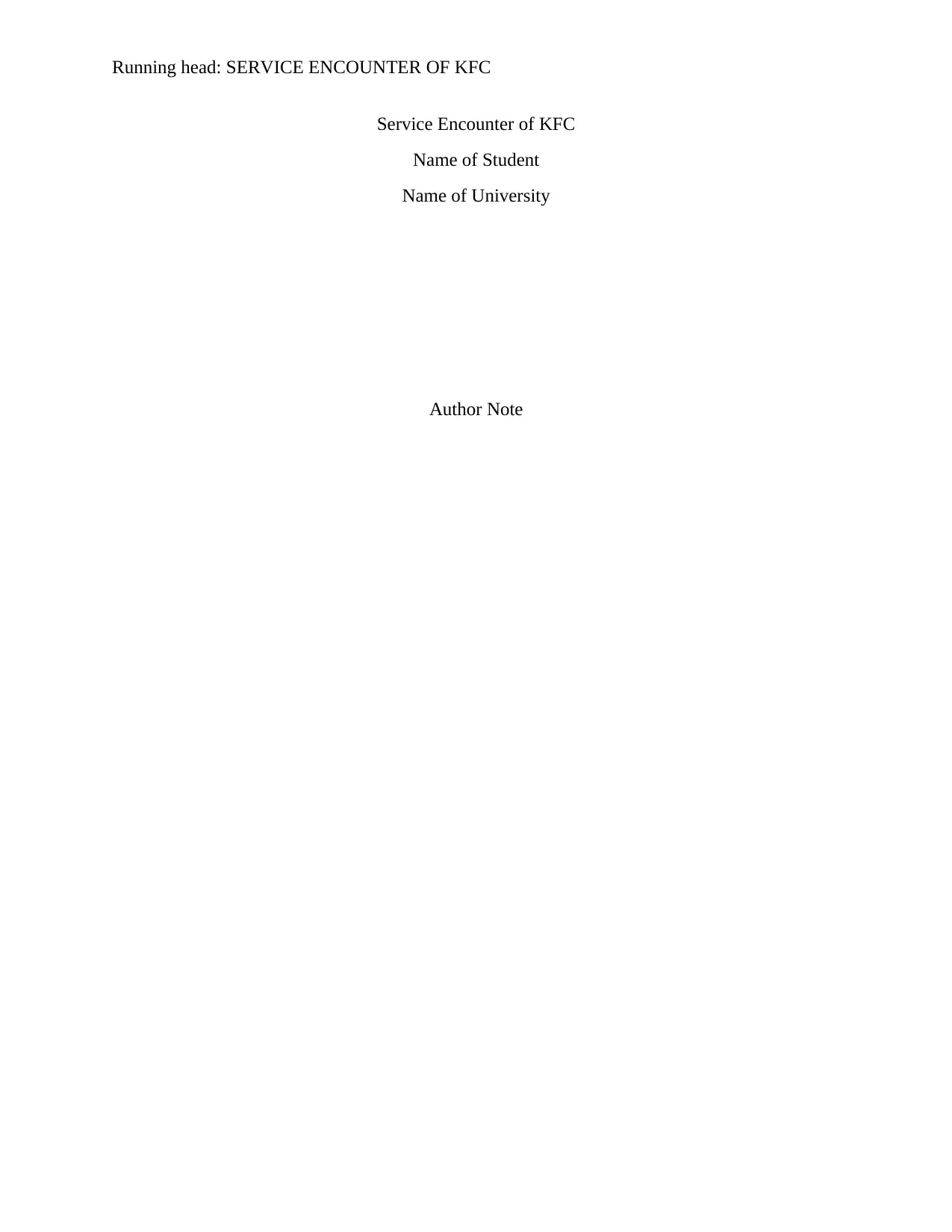
Running head: SERVICE ENCOUNTER OF KFC
Service Encounter of KFC
Name of Student
Name of University
Author Note
Service Encounter of KFC
Name of Student
Name of University
Author Note
Paraphrase This Document
Need a fresh take? Get an instant paraphrase of this document with our AI Paraphraser
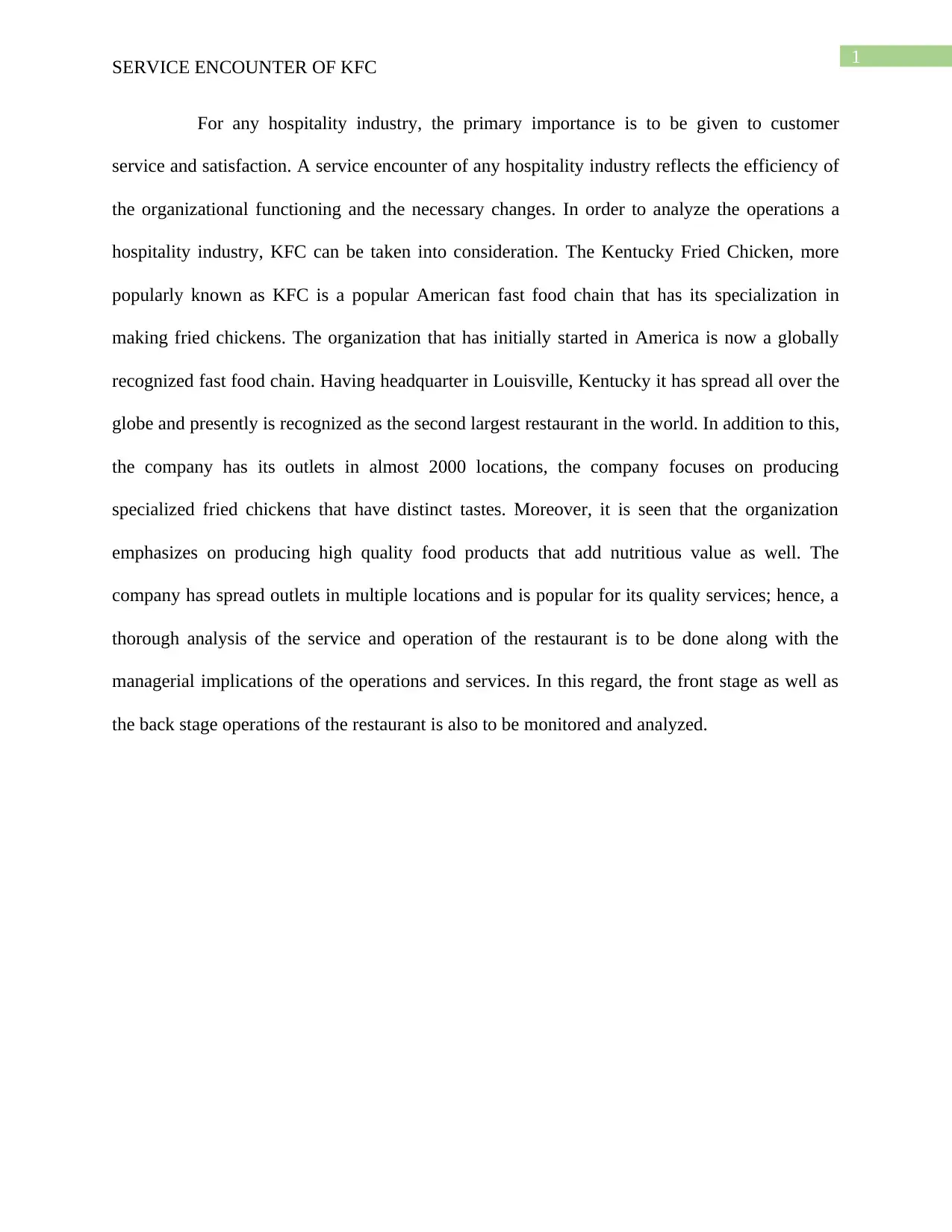
1
SERVICE ENCOUNTER OF KFC
For any hospitality industry, the primary importance is to be given to customer
service and satisfaction. A service encounter of any hospitality industry reflects the efficiency of
the organizational functioning and the necessary changes. In order to analyze the operations a
hospitality industry, KFC can be taken into consideration. The Kentucky Fried Chicken, more
popularly known as KFC is a popular American fast food chain that has its specialization in
making fried chickens. The organization that has initially started in America is now a globally
recognized fast food chain. Having headquarter in Louisville, Kentucky it has spread all over the
globe and presently is recognized as the second largest restaurant in the world. In addition to this,
the company has its outlets in almost 2000 locations, the company focuses on producing
specialized fried chickens that have distinct tastes. Moreover, it is seen that the organization
emphasizes on producing high quality food products that add nutritious value as well. The
company has spread outlets in multiple locations and is popular for its quality services; hence, a
thorough analysis of the service and operation of the restaurant is to be done along with the
managerial implications of the operations and services. In this regard, the front stage as well as
the back stage operations of the restaurant is also to be monitored and analyzed.
SERVICE ENCOUNTER OF KFC
For any hospitality industry, the primary importance is to be given to customer
service and satisfaction. A service encounter of any hospitality industry reflects the efficiency of
the organizational functioning and the necessary changes. In order to analyze the operations a
hospitality industry, KFC can be taken into consideration. The Kentucky Fried Chicken, more
popularly known as KFC is a popular American fast food chain that has its specialization in
making fried chickens. The organization that has initially started in America is now a globally
recognized fast food chain. Having headquarter in Louisville, Kentucky it has spread all over the
globe and presently is recognized as the second largest restaurant in the world. In addition to this,
the company has its outlets in almost 2000 locations, the company focuses on producing
specialized fried chickens that have distinct tastes. Moreover, it is seen that the organization
emphasizes on producing high quality food products that add nutritious value as well. The
company has spread outlets in multiple locations and is popular for its quality services; hence, a
thorough analysis of the service and operation of the restaurant is to be done along with the
managerial implications of the operations and services. In this regard, the front stage as well as
the back stage operations of the restaurant is also to be monitored and analyzed.
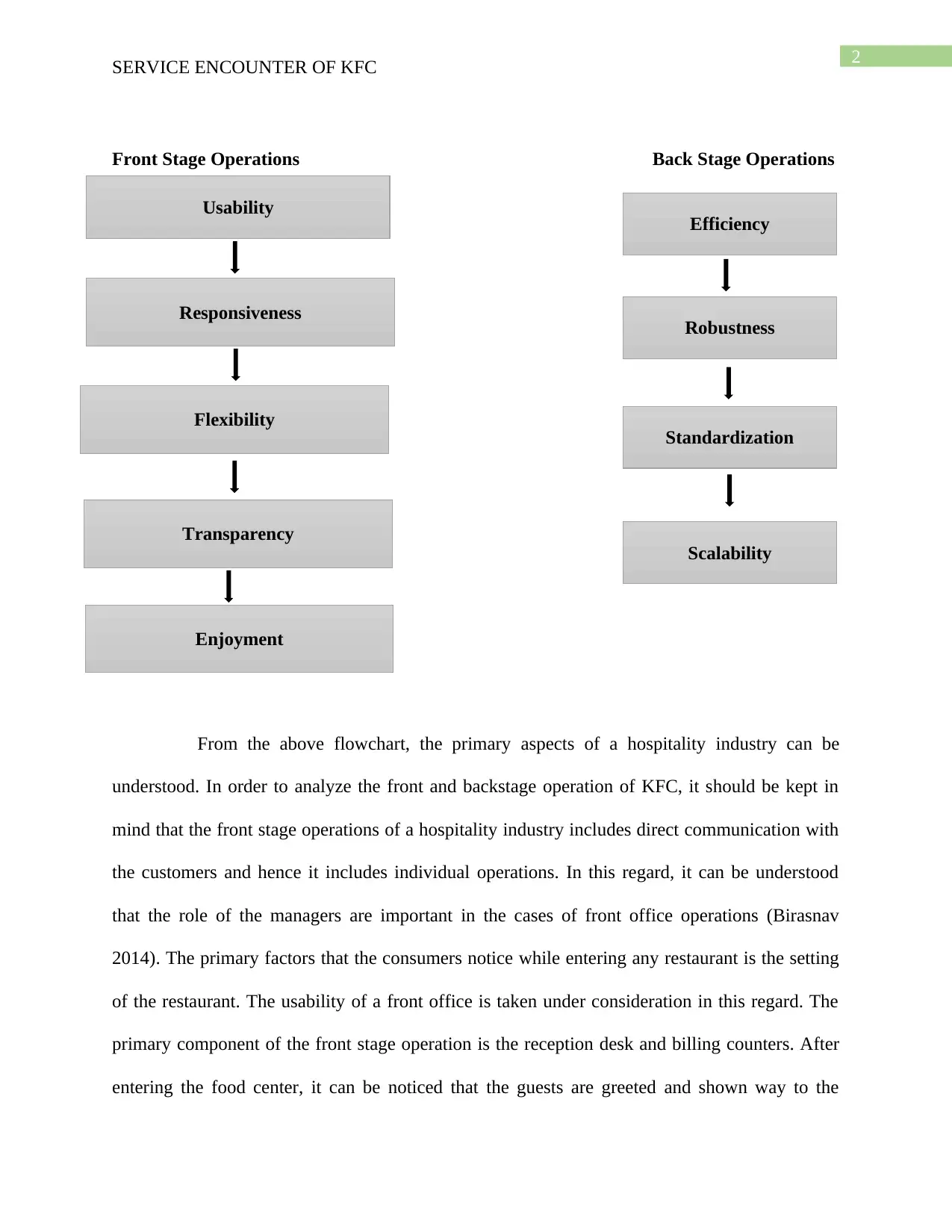
2
SERVICE ENCOUNTER OF KFC
Front Stage Operations Back Stage Operations
From the above flowchart, the primary aspects of a hospitality industry can be
understood. In order to analyze the front and backstage operation of KFC, it should be kept in
mind that the front stage operations of a hospitality industry includes direct communication with
the customers and hence it includes individual operations. In this regard, it can be understood
that the role of the managers are important in the cases of front office operations (Birasnav
2014). The primary factors that the consumers notice while entering any restaurant is the setting
of the restaurant. The usability of a front office is taken under consideration in this regard. The
primary component of the front stage operation is the reception desk and billing counters. After
entering the food center, it can be noticed that the guests are greeted and shown way to the
Usability
Responsiveness
Enjoyment
Transparency
Flexibility
Efficiency
Robustness
Standardization
Scalability
SERVICE ENCOUNTER OF KFC
Front Stage Operations Back Stage Operations
From the above flowchart, the primary aspects of a hospitality industry can be
understood. In order to analyze the front and backstage operation of KFC, it should be kept in
mind that the front stage operations of a hospitality industry includes direct communication with
the customers and hence it includes individual operations. In this regard, it can be understood
that the role of the managers are important in the cases of front office operations (Birasnav
2014). The primary factors that the consumers notice while entering any restaurant is the setting
of the restaurant. The usability of a front office is taken under consideration in this regard. The
primary component of the front stage operation is the reception desk and billing counters. After
entering the food center, it can be noticed that the guests are greeted and shown way to the
Usability
Responsiveness
Enjoyment
Transparency
Flexibility
Efficiency
Robustness
Standardization
Scalability
⊘ This is a preview!⊘
Do you want full access?
Subscribe today to unlock all pages.

Trusted by 1+ million students worldwide
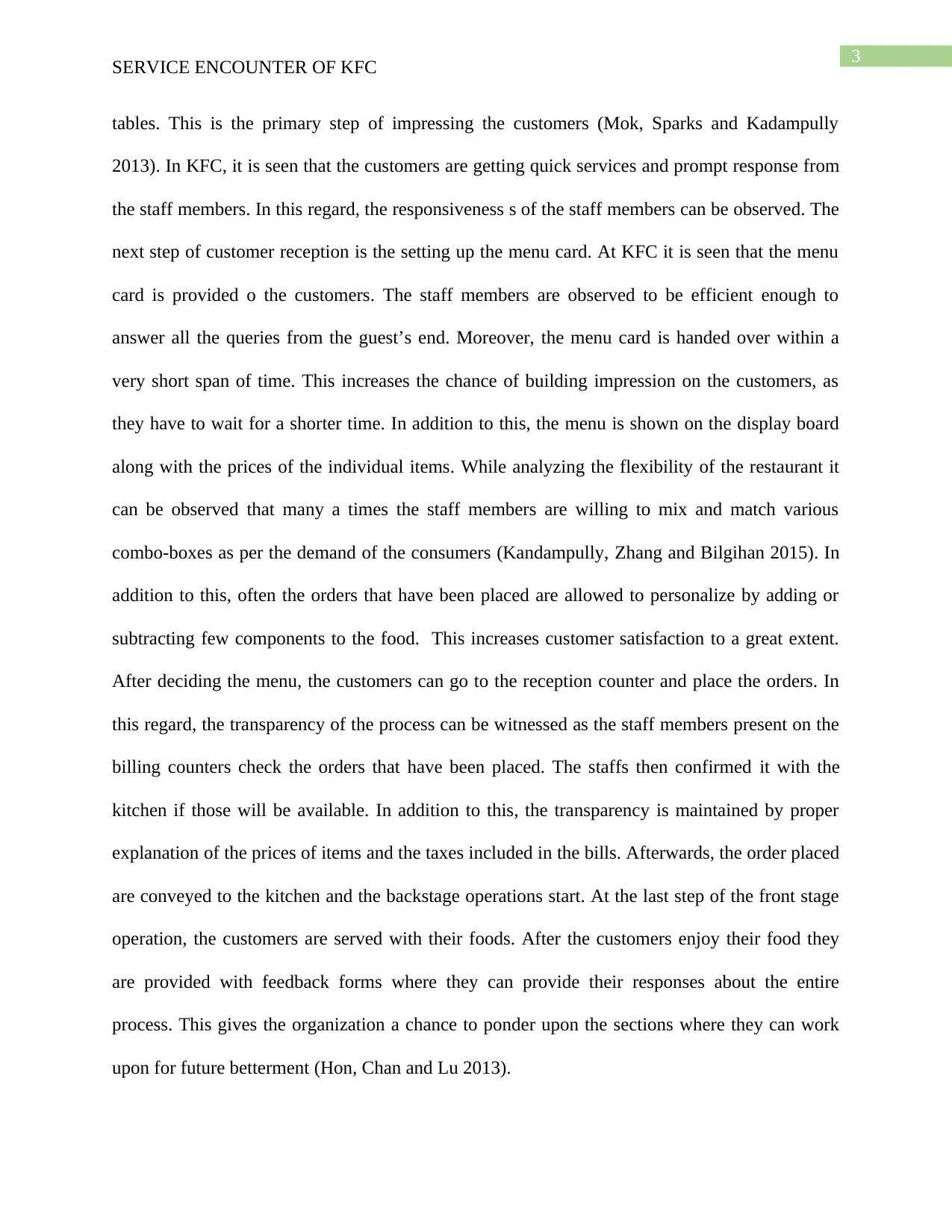
3
SERVICE ENCOUNTER OF KFC
tables. This is the primary step of impressing the customers (Mok, Sparks and Kadampully
2013). In KFC, it is seen that the customers are getting quick services and prompt response from
the staff members. In this regard, the responsiveness s of the staff members can be observed. The
next step of customer reception is the setting up the menu card. At KFC it is seen that the menu
card is provided o the customers. The staff members are observed to be efficient enough to
answer all the queries from the guest’s end. Moreover, the menu card is handed over within a
very short span of time. This increases the chance of building impression on the customers, as
they have to wait for a shorter time. In addition to this, the menu is shown on the display board
along with the prices of the individual items. While analyzing the flexibility of the restaurant it
can be observed that many a times the staff members are willing to mix and match various
combo-boxes as per the demand of the consumers (Kandampully, Zhang and Bilgihan 2015). In
addition to this, often the orders that have been placed are allowed to personalize by adding or
subtracting few components to the food. This increases customer satisfaction to a great extent.
After deciding the menu, the customers can go to the reception counter and place the orders. In
this regard, the transparency of the process can be witnessed as the staff members present on the
billing counters check the orders that have been placed. The staffs then confirmed it with the
kitchen if those will be available. In addition to this, the transparency is maintained by proper
explanation of the prices of items and the taxes included in the bills. Afterwards, the order placed
are conveyed to the kitchen and the backstage operations start. At the last step of the front stage
operation, the customers are served with their foods. After the customers enjoy their food they
are provided with feedback forms where they can provide their responses about the entire
process. This gives the organization a chance to ponder upon the sections where they can work
upon for future betterment (Hon, Chan and Lu 2013).
SERVICE ENCOUNTER OF KFC
tables. This is the primary step of impressing the customers (Mok, Sparks and Kadampully
2013). In KFC, it is seen that the customers are getting quick services and prompt response from
the staff members. In this regard, the responsiveness s of the staff members can be observed. The
next step of customer reception is the setting up the menu card. At KFC it is seen that the menu
card is provided o the customers. The staff members are observed to be efficient enough to
answer all the queries from the guest’s end. Moreover, the menu card is handed over within a
very short span of time. This increases the chance of building impression on the customers, as
they have to wait for a shorter time. In addition to this, the menu is shown on the display board
along with the prices of the individual items. While analyzing the flexibility of the restaurant it
can be observed that many a times the staff members are willing to mix and match various
combo-boxes as per the demand of the consumers (Kandampully, Zhang and Bilgihan 2015). In
addition to this, often the orders that have been placed are allowed to personalize by adding or
subtracting few components to the food. This increases customer satisfaction to a great extent.
After deciding the menu, the customers can go to the reception counter and place the orders. In
this regard, the transparency of the process can be witnessed as the staff members present on the
billing counters check the orders that have been placed. The staffs then confirmed it with the
kitchen if those will be available. In addition to this, the transparency is maintained by proper
explanation of the prices of items and the taxes included in the bills. Afterwards, the order placed
are conveyed to the kitchen and the backstage operations start. At the last step of the front stage
operation, the customers are served with their foods. After the customers enjoy their food they
are provided with feedback forms where they can provide their responses about the entire
process. This gives the organization a chance to ponder upon the sections where they can work
upon for future betterment (Hon, Chan and Lu 2013).
Paraphrase This Document
Need a fresh take? Get an instant paraphrase of this document with our AI Paraphraser
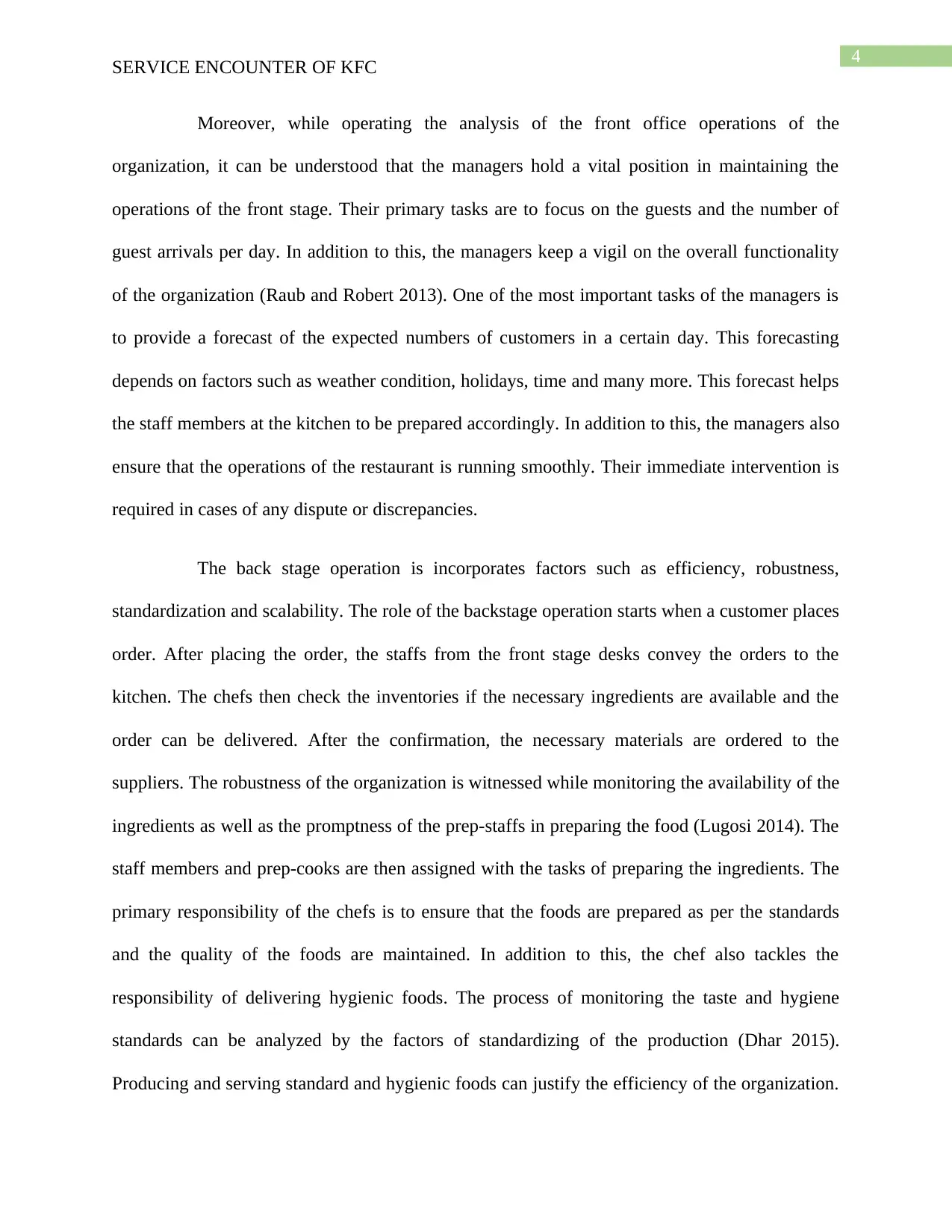
4
SERVICE ENCOUNTER OF KFC
Moreover, while operating the analysis of the front office operations of the
organization, it can be understood that the managers hold a vital position in maintaining the
operations of the front stage. Their primary tasks are to focus on the guests and the number of
guest arrivals per day. In addition to this, the managers keep a vigil on the overall functionality
of the organization (Raub and Robert 2013). One of the most important tasks of the managers is
to provide a forecast of the expected numbers of customers in a certain day. This forecasting
depends on factors such as weather condition, holidays, time and many more. This forecast helps
the staff members at the kitchen to be prepared accordingly. In addition to this, the managers also
ensure that the operations of the restaurant is running smoothly. Their immediate intervention is
required in cases of any dispute or discrepancies.
The back stage operation is incorporates factors such as efficiency, robustness,
standardization and scalability. The role of the backstage operation starts when a customer places
order. After placing the order, the staffs from the front stage desks convey the orders to the
kitchen. The chefs then check the inventories if the necessary ingredients are available and the
order can be delivered. After the confirmation, the necessary materials are ordered to the
suppliers. The robustness of the organization is witnessed while monitoring the availability of the
ingredients as well as the promptness of the prep-staffs in preparing the food (Lugosi 2014). The
staff members and prep-cooks are then assigned with the tasks of preparing the ingredients. The
primary responsibility of the chefs is to ensure that the foods are prepared as per the standards
and the quality of the foods are maintained. In addition to this, the chef also tackles the
responsibility of delivering hygienic foods. The process of monitoring the taste and hygiene
standards can be analyzed by the factors of standardizing of the production (Dhar 2015).
Producing and serving standard and hygienic foods can justify the efficiency of the organization.
SERVICE ENCOUNTER OF KFC
Moreover, while operating the analysis of the front office operations of the
organization, it can be understood that the managers hold a vital position in maintaining the
operations of the front stage. Their primary tasks are to focus on the guests and the number of
guest arrivals per day. In addition to this, the managers keep a vigil on the overall functionality
of the organization (Raub and Robert 2013). One of the most important tasks of the managers is
to provide a forecast of the expected numbers of customers in a certain day. This forecasting
depends on factors such as weather condition, holidays, time and many more. This forecast helps
the staff members at the kitchen to be prepared accordingly. In addition to this, the managers also
ensure that the operations of the restaurant is running smoothly. Their immediate intervention is
required in cases of any dispute or discrepancies.
The back stage operation is incorporates factors such as efficiency, robustness,
standardization and scalability. The role of the backstage operation starts when a customer places
order. After placing the order, the staffs from the front stage desks convey the orders to the
kitchen. The chefs then check the inventories if the necessary ingredients are available and the
order can be delivered. After the confirmation, the necessary materials are ordered to the
suppliers. The robustness of the organization is witnessed while monitoring the availability of the
ingredients as well as the promptness of the prep-staffs in preparing the food (Lugosi 2014). The
staff members and prep-cooks are then assigned with the tasks of preparing the ingredients. The
primary responsibility of the chefs is to ensure that the foods are prepared as per the standards
and the quality of the foods are maintained. In addition to this, the chef also tackles the
responsibility of delivering hygienic foods. The process of monitoring the taste and hygiene
standards can be analyzed by the factors of standardizing of the production (Dhar 2015).
Producing and serving standard and hygienic foods can justify the efficiency of the organization.
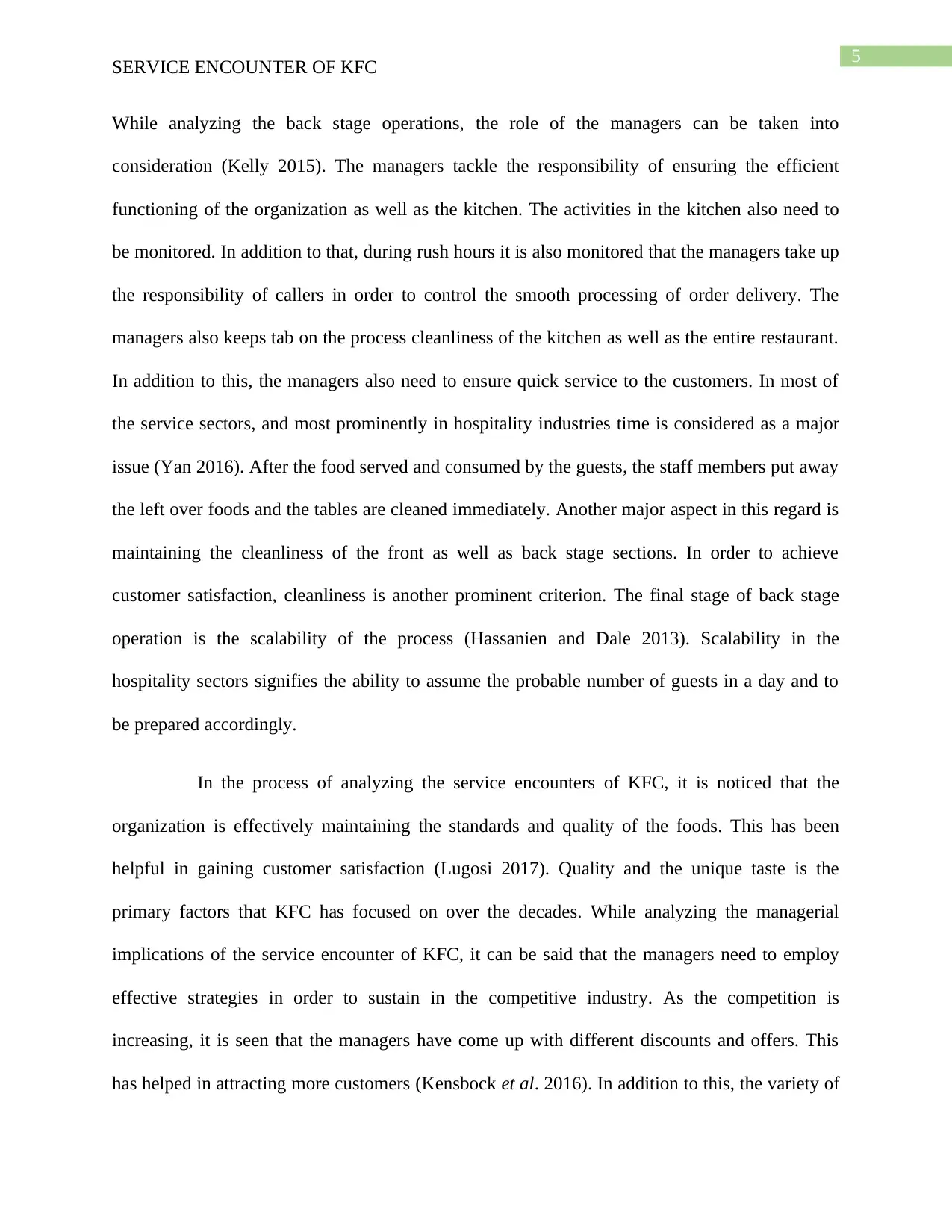
5
SERVICE ENCOUNTER OF KFC
While analyzing the back stage operations, the role of the managers can be taken into
consideration (Kelly 2015). The managers tackle the responsibility of ensuring the efficient
functioning of the organization as well as the kitchen. The activities in the kitchen also need to
be monitored. In addition to that, during rush hours it is also monitored that the managers take up
the responsibility of callers in order to control the smooth processing of order delivery. The
managers also keeps tab on the process cleanliness of the kitchen as well as the entire restaurant.
In addition to this, the managers also need to ensure quick service to the customers. In most of
the service sectors, and most prominently in hospitality industries time is considered as a major
issue (Yan 2016). After the food served and consumed by the guests, the staff members put away
the left over foods and the tables are cleaned immediately. Another major aspect in this regard is
maintaining the cleanliness of the front as well as back stage sections. In order to achieve
customer satisfaction, cleanliness is another prominent criterion. The final stage of back stage
operation is the scalability of the process (Hassanien and Dale 2013). Scalability in the
hospitality sectors signifies the ability to assume the probable number of guests in a day and to
be prepared accordingly.
In the process of analyzing the service encounters of KFC, it is noticed that the
organization is effectively maintaining the standards and quality of the foods. This has been
helpful in gaining customer satisfaction (Lugosi 2017). Quality and the unique taste is the
primary factors that KFC has focused on over the decades. While analyzing the managerial
implications of the service encounter of KFC, it can be said that the managers need to employ
effective strategies in order to sustain in the competitive industry. As the competition is
increasing, it is seen that the managers have come up with different discounts and offers. This
has helped in attracting more customers (Kensbock et al. 2016). In addition to this, the variety of
SERVICE ENCOUNTER OF KFC
While analyzing the back stage operations, the role of the managers can be taken into
consideration (Kelly 2015). The managers tackle the responsibility of ensuring the efficient
functioning of the organization as well as the kitchen. The activities in the kitchen also need to
be monitored. In addition to that, during rush hours it is also monitored that the managers take up
the responsibility of callers in order to control the smooth processing of order delivery. The
managers also keeps tab on the process cleanliness of the kitchen as well as the entire restaurant.
In addition to this, the managers also need to ensure quick service to the customers. In most of
the service sectors, and most prominently in hospitality industries time is considered as a major
issue (Yan 2016). After the food served and consumed by the guests, the staff members put away
the left over foods and the tables are cleaned immediately. Another major aspect in this regard is
maintaining the cleanliness of the front as well as back stage sections. In order to achieve
customer satisfaction, cleanliness is another prominent criterion. The final stage of back stage
operation is the scalability of the process (Hassanien and Dale 2013). Scalability in the
hospitality sectors signifies the ability to assume the probable number of guests in a day and to
be prepared accordingly.
In the process of analyzing the service encounters of KFC, it is noticed that the
organization is effectively maintaining the standards and quality of the foods. This has been
helpful in gaining customer satisfaction (Lugosi 2017). Quality and the unique taste is the
primary factors that KFC has focused on over the decades. While analyzing the managerial
implications of the service encounter of KFC, it can be said that the managers need to employ
effective strategies in order to sustain in the competitive industry. As the competition is
increasing, it is seen that the managers have come up with different discounts and offers. This
has helped in attracting more customers (Kensbock et al. 2016). In addition to this, the variety of
⊘ This is a preview!⊘
Do you want full access?
Subscribe today to unlock all pages.

Trusted by 1+ million students worldwide
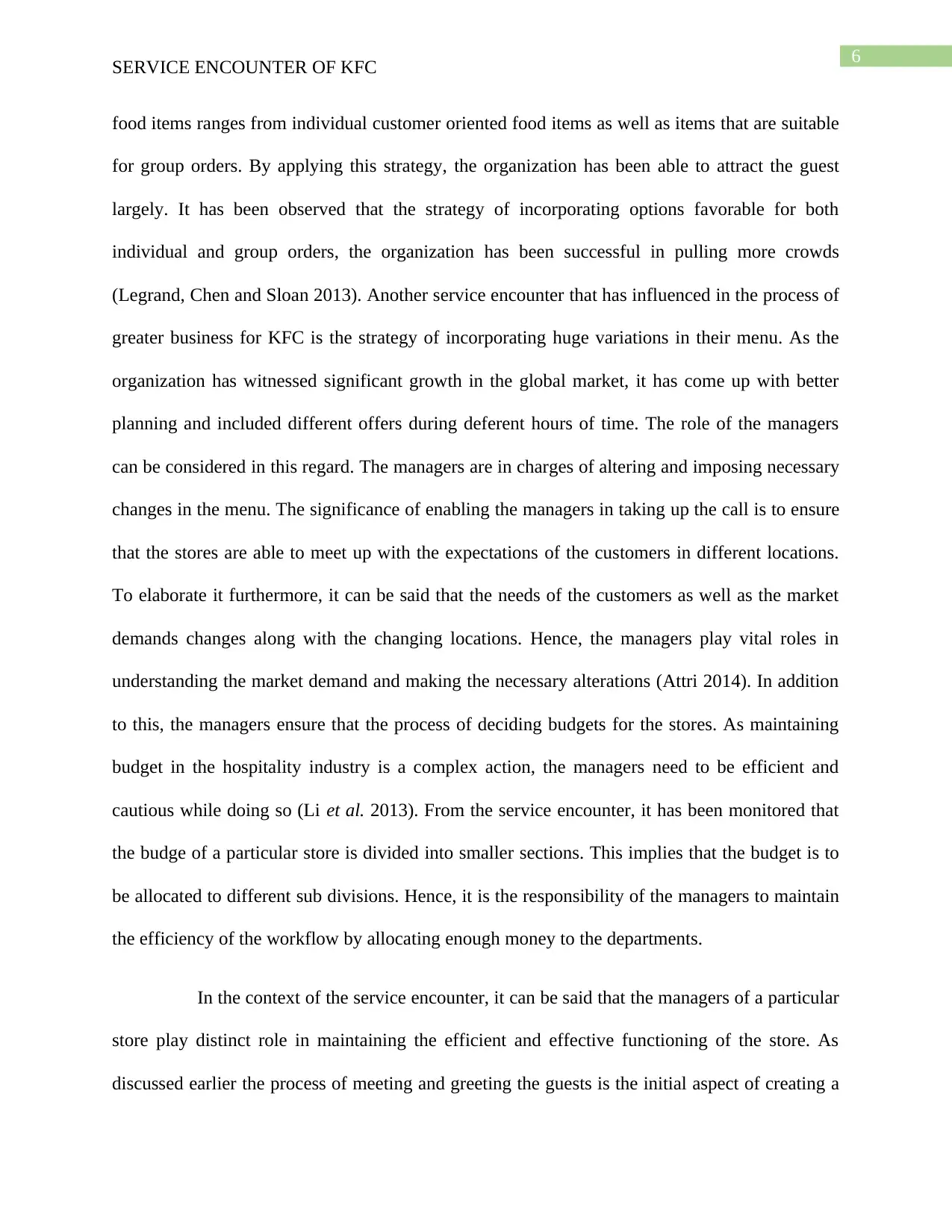
6
SERVICE ENCOUNTER OF KFC
food items ranges from individual customer oriented food items as well as items that are suitable
for group orders. By applying this strategy, the organization has been able to attract the guest
largely. It has been observed that the strategy of incorporating options favorable for both
individual and group orders, the organization has been successful in pulling more crowds
(Legrand, Chen and Sloan 2013). Another service encounter that has influenced in the process of
greater business for KFC is the strategy of incorporating huge variations in their menu. As the
organization has witnessed significant growth in the global market, it has come up with better
planning and included different offers during deferent hours of time. The role of the managers
can be considered in this regard. The managers are in charges of altering and imposing necessary
changes in the menu. The significance of enabling the managers in taking up the call is to ensure
that the stores are able to meet up with the expectations of the customers in different locations.
To elaborate it furthermore, it can be said that the needs of the customers as well as the market
demands changes along with the changing locations. Hence, the managers play vital roles in
understanding the market demand and making the necessary alterations (Attri 2014). In addition
to this, the managers ensure that the process of deciding budgets for the stores. As maintaining
budget in the hospitality industry is a complex action, the managers need to be efficient and
cautious while doing so (Li et al. 2013). From the service encounter, it has been monitored that
the budge of a particular store is divided into smaller sections. This implies that the budget is to
be allocated to different sub divisions. Hence, it is the responsibility of the managers to maintain
the efficiency of the workflow by allocating enough money to the departments.
In the context of the service encounter, it can be said that the managers of a particular
store play distinct role in maintaining the efficient and effective functioning of the store. As
discussed earlier the process of meeting and greeting the guests is the initial aspect of creating a
SERVICE ENCOUNTER OF KFC
food items ranges from individual customer oriented food items as well as items that are suitable
for group orders. By applying this strategy, the organization has been able to attract the guest
largely. It has been observed that the strategy of incorporating options favorable for both
individual and group orders, the organization has been successful in pulling more crowds
(Legrand, Chen and Sloan 2013). Another service encounter that has influenced in the process of
greater business for KFC is the strategy of incorporating huge variations in their menu. As the
organization has witnessed significant growth in the global market, it has come up with better
planning and included different offers during deferent hours of time. The role of the managers
can be considered in this regard. The managers are in charges of altering and imposing necessary
changes in the menu. The significance of enabling the managers in taking up the call is to ensure
that the stores are able to meet up with the expectations of the customers in different locations.
To elaborate it furthermore, it can be said that the needs of the customers as well as the market
demands changes along with the changing locations. Hence, the managers play vital roles in
understanding the market demand and making the necessary alterations (Attri 2014). In addition
to this, the managers ensure that the process of deciding budgets for the stores. As maintaining
budget in the hospitality industry is a complex action, the managers need to be efficient and
cautious while doing so (Li et al. 2013). From the service encounter, it has been monitored that
the budge of a particular store is divided into smaller sections. This implies that the budget is to
be allocated to different sub divisions. Hence, it is the responsibility of the managers to maintain
the efficiency of the workflow by allocating enough money to the departments.
In the context of the service encounter, it can be said that the managers of a particular
store play distinct role in maintaining the efficient and effective functioning of the store. As
discussed earlier the process of meeting and greeting the guests is the initial aspect of creating a
Paraphrase This Document
Need a fresh take? Get an instant paraphrase of this document with our AI Paraphraser
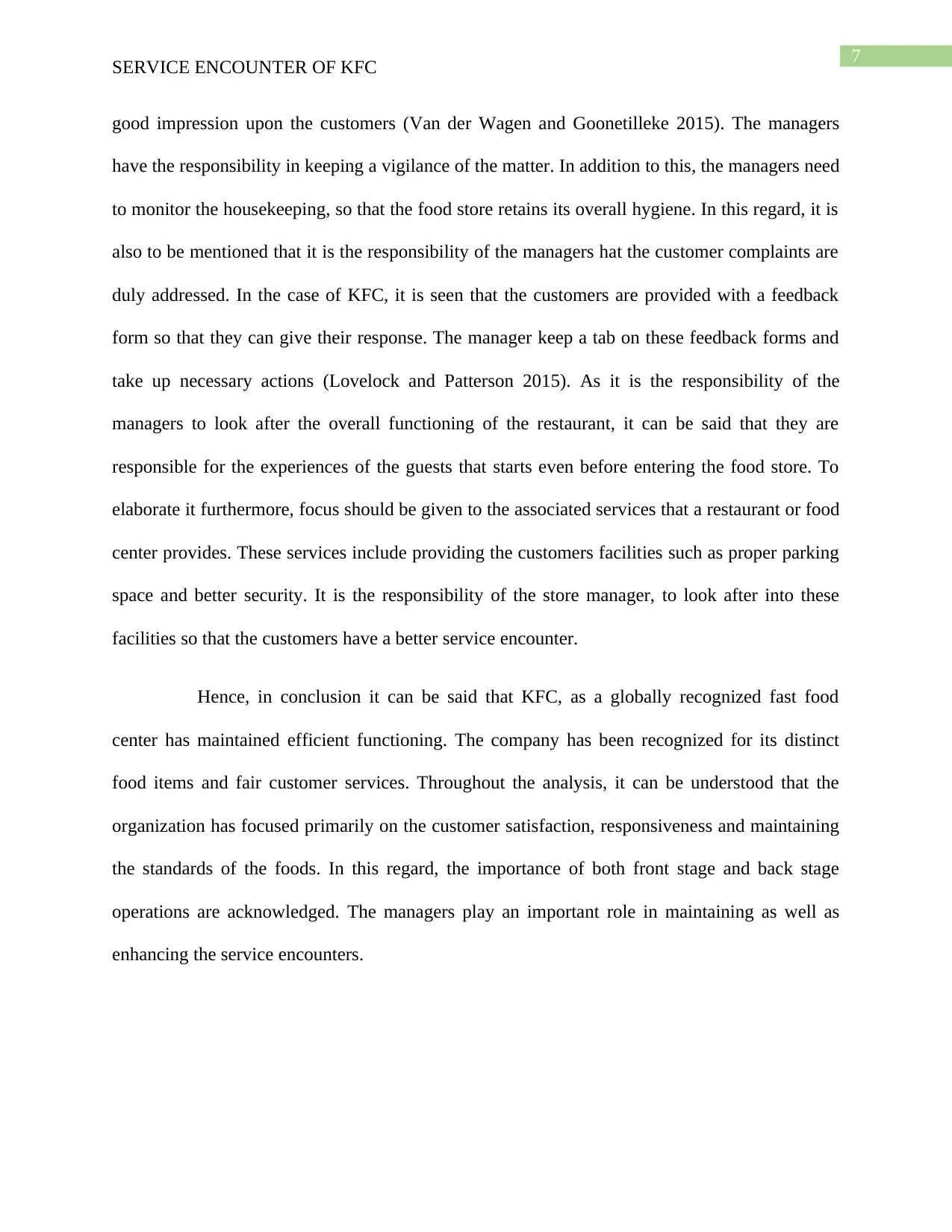
7
SERVICE ENCOUNTER OF KFC
good impression upon the customers (Van der Wagen and Goonetilleke 2015). The managers
have the responsibility in keeping a vigilance of the matter. In addition to this, the managers need
to monitor the housekeeping, so that the food store retains its overall hygiene. In this regard, it is
also to be mentioned that it is the responsibility of the managers hat the customer complaints are
duly addressed. In the case of KFC, it is seen that the customers are provided with a feedback
form so that they can give their response. The manager keep a tab on these feedback forms and
take up necessary actions (Lovelock and Patterson 2015). As it is the responsibility of the
managers to look after the overall functioning of the restaurant, it can be said that they are
responsible for the experiences of the guests that starts even before entering the food store. To
elaborate it furthermore, focus should be given to the associated services that a restaurant or food
center provides. These services include providing the customers facilities such as proper parking
space and better security. It is the responsibility of the store manager, to look after into these
facilities so that the customers have a better service encounter.
Hence, in conclusion it can be said that KFC, as a globally recognized fast food
center has maintained efficient functioning. The company has been recognized for its distinct
food items and fair customer services. Throughout the analysis, it can be understood that the
organization has focused primarily on the customer satisfaction, responsiveness and maintaining
the standards of the foods. In this regard, the importance of both front stage and back stage
operations are acknowledged. The managers play an important role in maintaining as well as
enhancing the service encounters.
SERVICE ENCOUNTER OF KFC
good impression upon the customers (Van der Wagen and Goonetilleke 2015). The managers
have the responsibility in keeping a vigilance of the matter. In addition to this, the managers need
to monitor the housekeeping, so that the food store retains its overall hygiene. In this regard, it is
also to be mentioned that it is the responsibility of the managers hat the customer complaints are
duly addressed. In the case of KFC, it is seen that the customers are provided with a feedback
form so that they can give their response. The manager keep a tab on these feedback forms and
take up necessary actions (Lovelock and Patterson 2015). As it is the responsibility of the
managers to look after the overall functioning of the restaurant, it can be said that they are
responsible for the experiences of the guests that starts even before entering the food store. To
elaborate it furthermore, focus should be given to the associated services that a restaurant or food
center provides. These services include providing the customers facilities such as proper parking
space and better security. It is the responsibility of the store manager, to look after into these
facilities so that the customers have a better service encounter.
Hence, in conclusion it can be said that KFC, as a globally recognized fast food
center has maintained efficient functioning. The company has been recognized for its distinct
food items and fair customer services. Throughout the analysis, it can be understood that the
organization has focused primarily on the customer satisfaction, responsiveness and maintaining
the standards of the foods. In this regard, the importance of both front stage and back stage
operations are acknowledged. The managers play an important role in maintaining as well as
enhancing the service encounters.
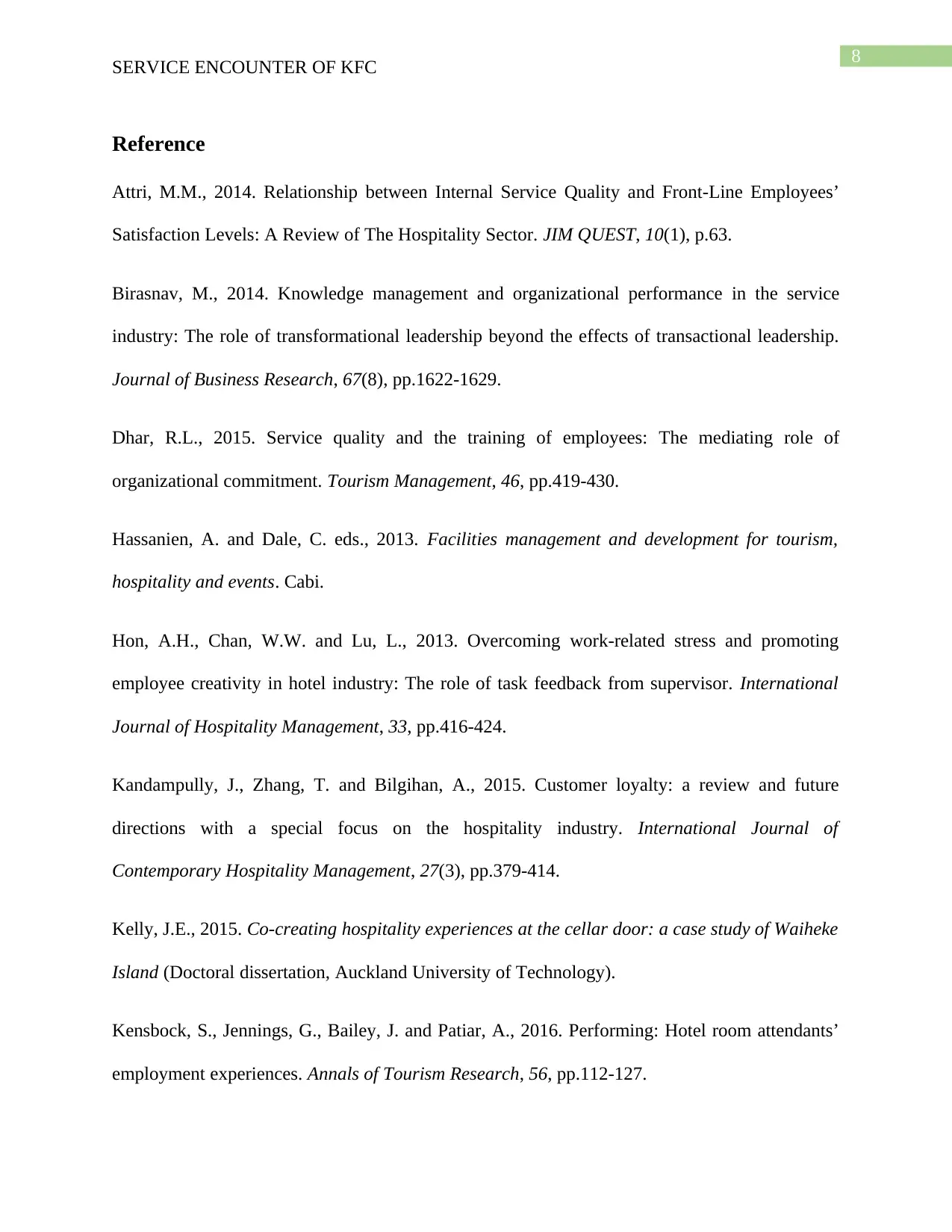
8
SERVICE ENCOUNTER OF KFC
Reference
Attri, M.M., 2014. Relationship between Internal Service Quality and Front-Line Employees’
Satisfaction Levels: A Review of The Hospitality Sector. JIM QUEST, 10(1), p.63.
Birasnav, M., 2014. Knowledge management and organizational performance in the service
industry: The role of transformational leadership beyond the effects of transactional leadership.
Journal of Business Research, 67(8), pp.1622-1629.
Dhar, R.L., 2015. Service quality and the training of employees: The mediating role of
organizational commitment. Tourism Management, 46, pp.419-430.
Hassanien, A. and Dale, C. eds., 2013. Facilities management and development for tourism,
hospitality and events. Cabi.
Hon, A.H., Chan, W.W. and Lu, L., 2013. Overcoming work-related stress and promoting
employee creativity in hotel industry: The role of task feedback from supervisor. International
Journal of Hospitality Management, 33, pp.416-424.
Kandampully, J., Zhang, T. and Bilgihan, A., 2015. Customer loyalty: a review and future
directions with a special focus on the hospitality industry. International Journal of
Contemporary Hospitality Management, 27(3), pp.379-414.
Kelly, J.E., 2015. Co-creating hospitality experiences at the cellar door: a case study of Waiheke
Island (Doctoral dissertation, Auckland University of Technology).
Kensbock, S., Jennings, G., Bailey, J. and Patiar, A., 2016. Performing: Hotel room attendants’
employment experiences. Annals of Tourism Research, 56, pp.112-127.
SERVICE ENCOUNTER OF KFC
Reference
Attri, M.M., 2014. Relationship between Internal Service Quality and Front-Line Employees’
Satisfaction Levels: A Review of The Hospitality Sector. JIM QUEST, 10(1), p.63.
Birasnav, M., 2014. Knowledge management and organizational performance in the service
industry: The role of transformational leadership beyond the effects of transactional leadership.
Journal of Business Research, 67(8), pp.1622-1629.
Dhar, R.L., 2015. Service quality and the training of employees: The mediating role of
organizational commitment. Tourism Management, 46, pp.419-430.
Hassanien, A. and Dale, C. eds., 2013. Facilities management and development for tourism,
hospitality and events. Cabi.
Hon, A.H., Chan, W.W. and Lu, L., 2013. Overcoming work-related stress and promoting
employee creativity in hotel industry: The role of task feedback from supervisor. International
Journal of Hospitality Management, 33, pp.416-424.
Kandampully, J., Zhang, T. and Bilgihan, A., 2015. Customer loyalty: a review and future
directions with a special focus on the hospitality industry. International Journal of
Contemporary Hospitality Management, 27(3), pp.379-414.
Kelly, J.E., 2015. Co-creating hospitality experiences at the cellar door: a case study of Waiheke
Island (Doctoral dissertation, Auckland University of Technology).
Kensbock, S., Jennings, G., Bailey, J. and Patiar, A., 2016. Performing: Hotel room attendants’
employment experiences. Annals of Tourism Research, 56, pp.112-127.
⊘ This is a preview!⊘
Do you want full access?
Subscribe today to unlock all pages.

Trusted by 1+ million students worldwide
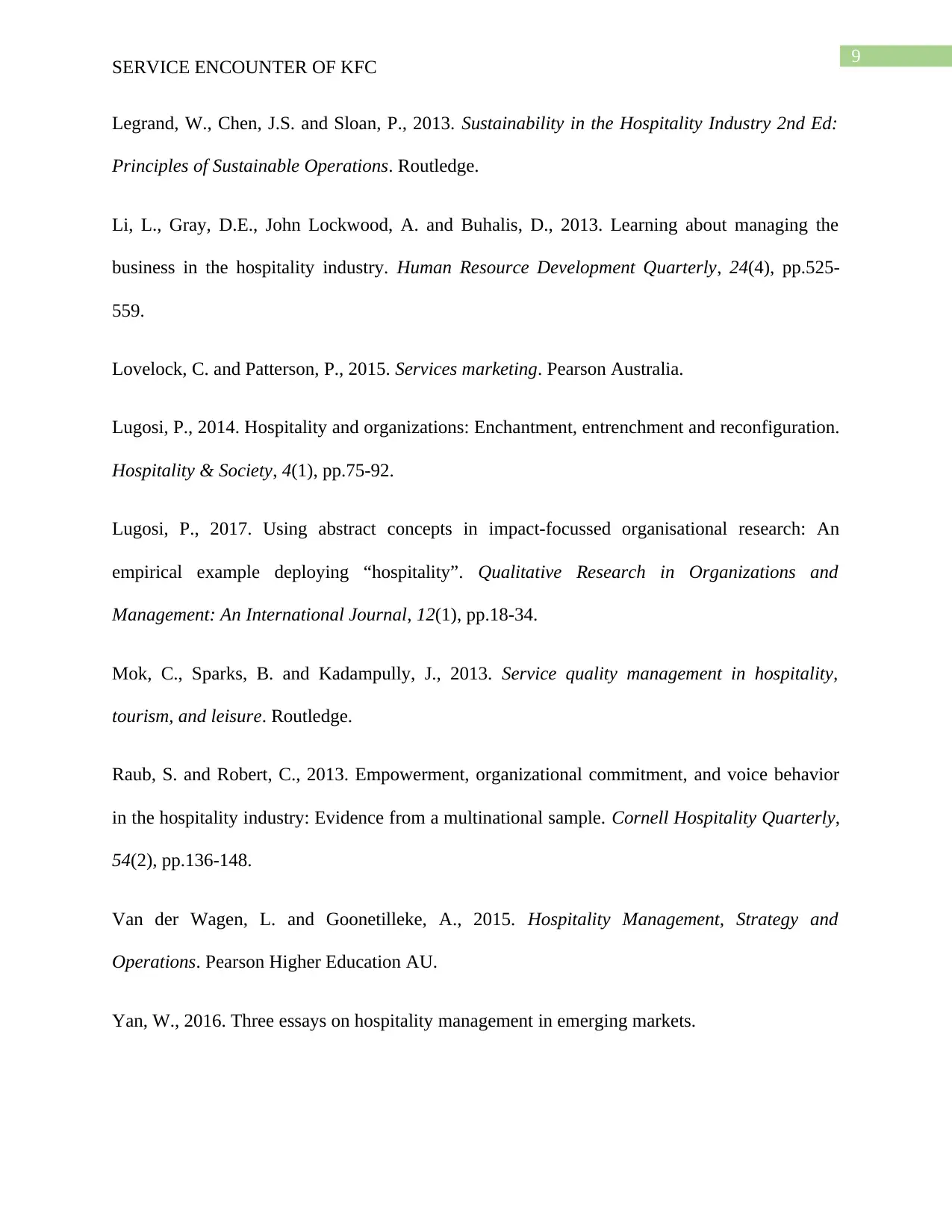
9
SERVICE ENCOUNTER OF KFC
Legrand, W., Chen, J.S. and Sloan, P., 2013. Sustainability in the Hospitality Industry 2nd Ed:
Principles of Sustainable Operations. Routledge.
Li, L., Gray, D.E., John Lockwood, A. and Buhalis, D., 2013. Learning about managing the
business in the hospitality industry. Human Resource Development Quarterly, 24(4), pp.525-
559.
Lovelock, C. and Patterson, P., 2015. Services marketing. Pearson Australia.
Lugosi, P., 2014. Hospitality and organizations: Enchantment, entrenchment and reconfiguration.
Hospitality & Society, 4(1), pp.75-92.
Lugosi, P., 2017. Using abstract concepts in impact-focussed organisational research: An
empirical example deploying “hospitality”. Qualitative Research in Organizations and
Management: An International Journal, 12(1), pp.18-34.
Mok, C., Sparks, B. and Kadampully, J., 2013. Service quality management in hospitality,
tourism, and leisure. Routledge.
Raub, S. and Robert, C., 2013. Empowerment, organizational commitment, and voice behavior
in the hospitality industry: Evidence from a multinational sample. Cornell Hospitality Quarterly,
54(2), pp.136-148.
Van der Wagen, L. and Goonetilleke, A., 2015. Hospitality Management, Strategy and
Operations. Pearson Higher Education AU.
Yan, W., 2016. Three essays on hospitality management in emerging markets.
SERVICE ENCOUNTER OF KFC
Legrand, W., Chen, J.S. and Sloan, P., 2013. Sustainability in the Hospitality Industry 2nd Ed:
Principles of Sustainable Operations. Routledge.
Li, L., Gray, D.E., John Lockwood, A. and Buhalis, D., 2013. Learning about managing the
business in the hospitality industry. Human Resource Development Quarterly, 24(4), pp.525-
559.
Lovelock, C. and Patterson, P., 2015. Services marketing. Pearson Australia.
Lugosi, P., 2014. Hospitality and organizations: Enchantment, entrenchment and reconfiguration.
Hospitality & Society, 4(1), pp.75-92.
Lugosi, P., 2017. Using abstract concepts in impact-focussed organisational research: An
empirical example deploying “hospitality”. Qualitative Research in Organizations and
Management: An International Journal, 12(1), pp.18-34.
Mok, C., Sparks, B. and Kadampully, J., 2013. Service quality management in hospitality,
tourism, and leisure. Routledge.
Raub, S. and Robert, C., 2013. Empowerment, organizational commitment, and voice behavior
in the hospitality industry: Evidence from a multinational sample. Cornell Hospitality Quarterly,
54(2), pp.136-148.
Van der Wagen, L. and Goonetilleke, A., 2015. Hospitality Management, Strategy and
Operations. Pearson Higher Education AU.
Yan, W., 2016. Three essays on hospitality management in emerging markets.
1 out of 10
Related Documents
Your All-in-One AI-Powered Toolkit for Academic Success.
+13062052269
info@desklib.com
Available 24*7 on WhatsApp / Email
![[object Object]](/_next/static/media/star-bottom.7253800d.svg)
Unlock your academic potential
Copyright © 2020–2025 A2Z Services. All Rights Reserved. Developed and managed by ZUCOL.




